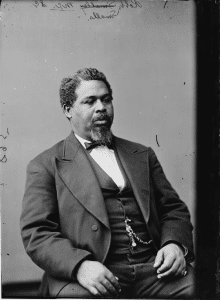Charleston History
This Month in South Carolina History: Robert Smalls Born in Beaufort

On April 5, 1839, Robert Smalls, Civil War hero, businessman, and political figure, was born in Beaufort, South Carolina. He was born and raised in slavery as his mother, Lydia Polite, was an enslaved woman working in the home of Henry McKee. At the age of 12, Smalls was sent to Charleston to be hired out as a laborer. He remained in Charleston, working various jobs throughout the city and on the waterfront.
It was in Charleston that Smalls was stationed to work onboard the CSS Planter, an armed Confederate steamer, during the Civil War. In May 1862, he commandeered the Planter and surrendered the boat to the Union Forces blockading Charleston Harbor. Upon turning over the Planter, Smalls and all other crew members on-board were free from slavery. Smalls was seen by many as a war hero, and he went on to serve in the Union Navy.
Following the war, Smalls’ status and popularity led him to politics. In 1868, the South Carolina legislature met in Charleston to write a new state constitution. For the first time, African American men, including Smalls, were allowed to vote as delegates at this convention. It was at the 1868 convention, that Smalls proposed legislation which laid the groundwork for free, compulsory public schooling for all South Carolina children, both black and white.
Following the convention, Smalls was elected to the South Carolina State Assembly and later the State Senate before serving five terms in the US House of Representatives. In addition to his political career, Smalls was an entrepreneur. In 1870, Smalls co-founded the Enterprise Railroad, a horse-drawn railroad network that connected the wharves and railroad depots in Charleston. He also owned and published the Beaufort-based newspaper, Beaufort Southern Standard.
Smalls lived through a period of immense political and social change in South Carolina. By the time of his death, states across the south had enacted policies including Jim Crow laws which rolled back many of the post-war advances made by Black South Carolinians. Smalls died in his home in Beaufort on February 22, 1915.
Image courtesy of the Library of Congress
























